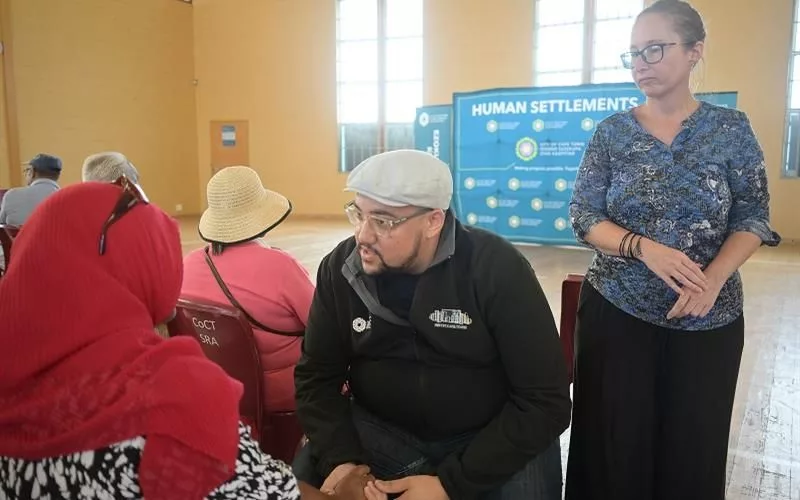Dr. MJ Phaahla is the Honourable Minister of Health leading South Africa’s health sector. He has been fighting against Covid-19 and focusing on Universal Health Coverage, human resource allocation, and infrastructure advancement in healthcare. The government is also addressing surgical procedure backlogs and HIV/AIDS, while advancing digital health systems. Dr. Phaahla emphasized the government’s commitment to enhancing the healthcare workforce, creating additional opportunities for doctors, and improving health services with infrastructure advancement.
Who is leading South Africa’s health sector?
The health sector in South Africa is led by the Honourable Minister of Health, Dr. MJ Phaahla. Dr. Phaahla has been at the forefront of the country’s fight against Covid-19 and has emphasized the importance of Universal Health Coverage, human resource allocation, and infrastructure advancement in healthcare. The government’s initiatives also encompass advancements in digital health systems and progress in addressing surgical procedure backlogs and HIV/AIDS.
The evolving terrain of South Africa’s health landscape is led by a prominent figure – the Honourable Minister of Health, Dr. MJ Phaahla. On 13th February 2024, Dr. Phaahla took to the floor of the nation’s assembly to contribute to the discourse on the State of the Nation Address.
In his address, the Minister conveyed his appreciation for the opportunity to speak, highlighting the tireless efforts of the 6th Administration, while acknowledging the existent hurdles. Dr. Phaahla voiced his recognition for the South African citizens who have experienced positive change under the democratic state. He chastised those who would downplay these real experiences, and reaffirmed the government’s pledge to advance the quality of life for its people.
The Impact and Recovery from Covid-19
The conversation was launched with the issue of the Covid-19 pandemic and its severe toll on South Africa. Dr. Phaahla emphasized the grit and determination shown by the healthcare workers, who shouldered the task of caring for the ill and facilitating the distribution of critical vaccines. He highlighted the crucial role of cooperation between public and private sectors, which laid the groundwork for the introduction of the National Health Insurance (NHI).
The healthcare sector has seen steady recovery since the lifting of all restrictions in June 2022. The Minister expressed his confidence in the progress made, emphasizing the bedrock of Universal Health Coverage, a vision embedded in the Freedom Charter and Section 27 of the Constitution. This journey began with the inaugural President of the democratic state, Nelson Mandela, who championed complimentary services for children under six and expectant mothers in all public health facilities.
Prioritizing Human Resources and Infrastructure in Healthcare
Dr. Phaahla voiced the importance of human resource allocation in ensuring both access to and quality of healthcare. The government is dedicated to retaining medical professionals within the public health system. He revealed that a solution was found to address the shortage of funded positions for doctors planning to stay in public service, with further details to be disclosed in Minister Godongwana’s Budget Speech. This coordination between the National and Provincial health departments is expected to streamline the recruitment process for medical professionals.
Dr. Phaahla proudly reported that the number of medical graduates had almost doubled in the last decade, underscoring the government’s commitment to enhancing the healthcare workforce. He also mentioned government efforts to create additional opportunities for doctors, including multidisciplinary group practices that provide Primary Health Services in local communities, as a way to pave the way for the implementation of the NHI.
The government’s initiatives to elevate health services also encompass infrastructure advancement. The construction of Limpopo Academic Hospital, slated for completion in 2028, is set to create over 2000 jobs. The hospital is expected to offer vital specialized clinical services, thereby reducing the need to transport patients to Gauteng. Moreover, the cutting-edge tertiary regional hospital in eThekwini, the Pixley Ka Isaka Seme hospital, was inaugurated in 2023 to alleviate pressure on surrounding hospitals.
Advancements and Achievements in Healthcare
The digital revolution in the health sector was evident when the Minister announced the implementation of the Health Patient Registration System, with over 60 million individuals now registered. These Digital Health Systems form an integral part of the government’s preparatory measures for the NHI.
Dr. Phaahla proudly noted that South Africa has bounced back effectively from the impact of Covid-19, with marked improvement in life expectancy and a decline in maternal mortality. Efforts to address surgical procedure backlogs, including orthopaedics and cataract removal, are also making headway.
South Africa’s battle against HIV and AIDS has seen noticeable progress. The Minister reported that steady strides have been made towards achieving the UNAIDS target of having 95% of people know their status, 95% of those individuals receiving treatment, and 95% achieving viral suppression. The prevention of HIV transmission from pregnant mothers to their babies has been successful, with the risk standing at a mere 0.3% in 2024.
The World Health Organisation’s recent report indicated that South Africa is on track with its Sustainable Development Goal targets for reducing TB. The country has seen over a 50% decrease in TB cases compared to data from 2015.
Dr. Phaahla wrapped up his address by underscoring the progress made by the ANC-led government, pre, during, and post the Covid-19 pandemic. He emphasized his vision of Universal Health Coverage, where citizens won’t have financial worries when in need of medical services. The NHI, once fully implemented, will aim to realize this ambition. He concluded by stating, “That is where we are heading.”
Who is Dr. MJ Phaahla?
Dr. MJ Phaahla is the Honourable Minister of Health leading South Africa’s health sector. He has been at the forefront of the country’s fight against Covid-19 and has emphasized the importance of Universal Health Coverage, human resource allocation, and infrastructure advancement in healthcare.
What is Universal Health Coverage?
Universal Health Coverage is a vision embedded in the Freedom Charter and Section 27 of the Constitution. It aims to provide quality health services to all citizens without fear of financial barriers.
What are the government’s initiatives to enhance healthcare workforce?
The government is committed to enhancing the healthcare workforce by creating additional opportunities for doctors, retaining medical professionals within the public health system, and streamlining the recruitment process for medical professionals. The number of medical graduates has almost doubled in the last decade, and multidisciplinary group practices that provide Primary Health Services in local communities are being established.
What are the government’s initiatives to advance healthcare infrastructure?
The government’s initiatives to elevate health services encompass infrastructure advancement, including the construction of Limpopo Academic Hospital and Pixley Ka Isaka Seme hospital. These hospitals are expected to create over 2000 jobs and offer specialized clinical services, reducing the need to transport patients to Gauteng.
What advancements have been made in digital health systems?
The implementation of the Health Patient Registration System has allowed over 60 million individuals to be registered. These Digital Health Systems form an integral part of the government’s preparatory measures for the National Health Insurance.
What progress has been made in addressing surgical procedure backlogs and HIV/AIDS?
Efforts to address surgical procedure backlogs, including orthopaedics and cataract removal, are making headway, and there has been a decline in maternal mortality. Steady strides have been made towards achieving the UNAIDS target of having 95% of people know their status, 95% of those individuals receiving treatment, and 95% achieving viral suppression. The prevention of HIV transmission from pregnant mothers to their babies has been successful, with the risk standing at a mere 0.3% in 2024.












